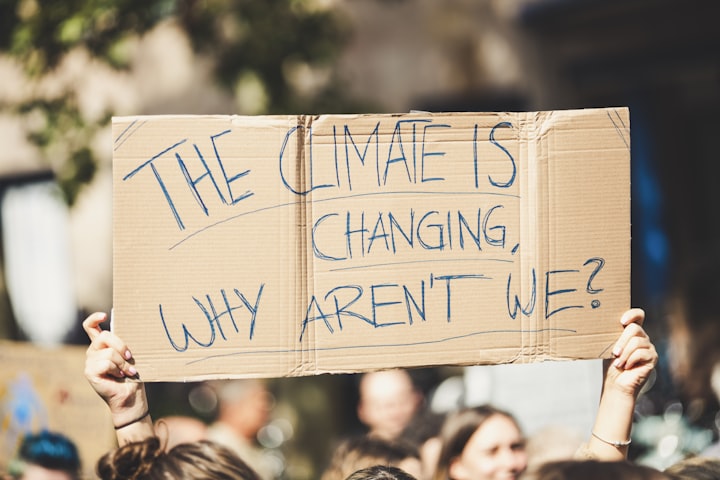Want to Help the Environment this Year? Vote for Economic Stability and Equality
Green Votes for a Greener Planet: Balancing Economic Stability and Equality in Your Ballot Choices

2024 is a turning point year for climate change. We must make radical and rapid changes to mitigate future damage, or we risk cementing the occurrence of an unprecedented catastrophe. I wish I was writing in hyperbole. “A course correction is urgently needed to limit warming to the 1.5 degrees Celsius set out in the Paris Agreement. Yet our current trajectory of between 2.5 and 2.9 degrees Celsius ensures the prospect of catastrophic climate change”, write Laurence Tubiana and Catherine McKenna of TIME in their article 2024 Must Be the Year for Exponential Climate Action. 2023 was a year of emission improvements, but not in any way were they rapid enough to keep up with the demand our planet has for it.
Going vegan, composting at home, and opting to take public transit won’t be enough to hit the goals we need to reach this year. To succeed at saving our future from catastrophe, we need to resort to global improvements. We need national cooperation. We need massive collective action.
How Do Economic Well-being and Environmental Health Intersect?
Economic policies and environmental health aren’t only intersecting, they’re interdependent. Economic activities like resource extraction, waste generation, and industrial production directly impact the environment. Conversely, pollution, climate change-caused weather events, and species extinction directly affect our profits and our people. We’ve already seen this in recent years, from supply chain disruptions to agricultural production issues to increased demand driving up costs of healthcare. If we want to make improvements in environmental health, we must pay attention to the economy we’re sustaining in our societies. Conversely, if we want to improve our economy, we must build a system that supports environmental health.
Why Governmental Action Is the Best Chance for Environmental Protection
When we as individuals make positive changes towards becoming more sustainable, that’s always a phenomenal step, certainly, but it’s still only a drop in the bucket. Any step in the right direction is still valuable to the cause but, in the grand scheme of things, that difference will always remain tiny, when compared to the actions of the nearly 8 billion others that roam the planet.
To magnify your impact, collective action is necessary. We already have a system that is built specifically for this sort of thing — the government! With our collective incomes, and overseeing our collective social contract agreements, this force of human society can be used to organize us and our resources to better our societies (Shocking, I know).
And governments around the world are already engaging in such activities. Regulation of waste management, pouring funds into natural landmark protection, promoting the research of sustainable technologies, and regulating how companies can pollute the land they reside on are all reasonably common parts of our nations’ and cities’ governing bodies. These are the collectives that have the resources to make massive changes to our planet dystopian or utopian — and there’s the added benefit that, in many places, these entities listen to the voices of their citizens.
Why You Should Vote for Sustainable Economic Practices
The single most impactful step you, as a citizen of the world, can do to help earth is to let your voice be heard. The candidates that you elect this year are going to be the folks responsible for either our success or failures in climate change and pollution mitigation. Coincidentally, they’re also the same folks responsible for much of the economic well-being of the people who have elected them. But the intersection doesn’t cease there.
According to Professor Samuel Stolper, an environmental economist at the University of Michigan, “Economists are increasingly studying the distributional impacts of environmental policy and, to a lesser extent, other aspects of environmental justice. The discipline can be helpful in identifying the causes of economic and environmental disparities as well as policies that can reduce such disparities”. With an increased overlap between the two disciplines, many others like Stolper are finding that the two are intimately interwoven. Swiss Re Institute echoes this principle eloquently in their 2021 publication, The Economics of Climate Change. Not only does the environment impact our global economy, but also our economies (and the disparity therein) directly impact our environment.
Why We Need to Tackle Inequality for a Greener Future
Sustainability isn’t accessible to everyone. Read that sentence again — it’s the most important one in this article. In many locales, there isn’t the choice to act sustainably, or the funds, or the stores, or the internet, or the education to understand why it matters. In cases like these, it would be reprehensible to blame those not fortunate enough to be able to make the choice. Instead, we should look into the root cause of the matter. Hint, more often than not, the cause of sustainability inequality is often economic.
Take the habitat fragmentation of the Amazon Rainforest, for example. According to UNESCO, the second greatest contributor to splitting the grand Amazon into small islands of habitable space is slash-and-burn farming, “typically conducted by small landowners who clear limited areas of forest each year”, and then burn the debris to temporarily improve the quality of poor soils in the region, unfit for agriculture. Unfortunately, these farmers must continue cutting deeper into the rainforest as the poor soil quickly degrades in quality. According to authors from the Smithsonian Tropical Research Institute and the Instituto de Biologia, Universidade Federal de Uberlândia this sort of agriculture “occurs both opportunistically and as a result of government-sponsored colonization programs that allocate forest plots of 50–200 ha to individual families”.
We need policies that promote both economic equality and environmental sustainability. People will not act sustainably when forced to choose between it or survival — or encouraged with incentives that outweigh Any issues involving society are almost always multifaceted, which warrants an approach that is equally (if not more) comprehensive. Any less of a broad approach is more of a treatment than a cure.
Overcoming Challenges and Resistance
There are many [valid] concerns about shifting the focus of economic policy to sustainability and environmental protection. The potential of job loss, national loss of competitiveness, and short-term financial burden on both companies and individuals should most certainly not be overlooked. For any approach to be truly sustainable for everyone, we cannot leave behind the workers, the citizens, and, yes, even those who don’t see the value of shifting towards sustainability. Sustainable economic practice can foster innovation, create new job opportunities, and enhance economic resilience, but we must ensure that these remain in focus. For such a societal and economic shift to work, we must design a cooperative policy that benefits everyone.
--
Our collective journey towards a future of environmental and fiscal health requires a comprehensive approach, one that takes into account the holistic causes and impacts of our actions as a species on Earth. This year, we must recognize the connection between political choice and environmental impact. We must strike a balance between economic growth and environmental stewardship. We must prioritize policies that advocate for society and the environment in equal measure. Only through these means can we shape a sustainable legacy for the generations beyond us.
P.S. For those of you folks in the United States, I urge you to take a moment and ensure that you’re registered to vote this year. Our planet is on the ballot, and that isn’t the sort of risk we can afford to take.
You can use this link to ensure you’re prepared for this incredibly important election:
--
Cross-posted from Medium. Follow my account for new science articles every Friday!
About the Creator
Olivia L. Dobbs
Science Enthusiast, Naturalist, Dreamer, Nerd.
I crosspost my Medium articles here :)
You can find my main account on Medium: https://medium.com/@oliviadobbs13
Check out my science! -> bit.ly/DobbsEtAl






Comments
There are no comments for this story
Be the first to respond and start the conversation.